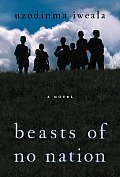 On Sunday I finished a little 135-page book called Beasts of No Nation, by a Nigerian named Uzudinma Iweala (I’m only typing that once, because I really need to concentrate on the spelling). The story is a first-person novel told from the viewpoint of a young boy abducted into a guerrilla army and everything that he endures–killing, butchering, sexual abuse (committed by him and upon him by his Commandant), and so much more.
On Sunday I finished a little 135-page book called Beasts of No Nation, by a Nigerian named Uzudinma Iweala (I’m only typing that once, because I really need to concentrate on the spelling). The story is a first-person novel told from the viewpoint of a young boy abducted into a guerrilla army and everything that he endures–killing, butchering, sexual abuse (committed by him and upon him by his Commandant), and so much more.
The story takes place in an “unnamed West African country,” which could easily be Sierra Leone, which underwent a horrific civil war during the 1990s. My denomination has had mission work in Sierra Leone since the 1850s, so we followed the fighting and attendant atrocities in Sierra Leone closely. But the country could as easily be Liberia, or maybe even Nigeria, where the author is from.
The book is an award-winning, acclaimed first novel, and appeared on various lists of the best books of 2005. It reads quickly, and yet is a bit difficult to read, because of the linguistic style. Here’s a sample passage:
“I am knowing I am no more child so if this war is ending I cannot be going back to doing child thing. No, I will be going back to be teachering or farming, or Doctor or Engineer, and I will be finding my mother and my sister, but not my father because he is dying in this war.”
The author wrote this as his senior thesis at Harvard. I read interviews on the web in which he talked about the book, and how his curiosity was first aroused when he read a story about child soldiers in Sierra Leone. He said, “One of the problems that the communities face is that sometimes the kids who are forced to fight are forced to commit atrocities against their own community members, to disconnect them from their communities, and make it impossible for them to go back. So they have nothing to do but fight, because they have nowhere to go. So then the war is ended, and now you have this kid who’s gone and killed people in his own community. Is that community just supposed to accept him back, without any problems?”
Gary Dilley, our director of Global Ministries, told me that the city of Bo (in Sierra Leone) has a number of former child soldiers exactly like this–nobody wants them because of the things they’ve done. The government has given them all bicycles as a tool for employment. But my, how they must be scarred in so many ways.





